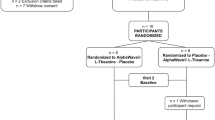Abstract
γ-Aminobutyric acid (GABA) is a kind of amino acid contained in green tea leaves and other foods. Several reports have shown that GABA might affect brain protein synthesis, improve many brain functions such as memory and study capability, lower the blood pressure of spontaneously hypertensive rats, and may also have a relaxation effect in humans. However, the evidence for its mood-improving function is still not sufficient. In this study, we investigated how the oral intake of GABA influences human adults psychologically and physiologically under a condition of mental stress. Sixty-three adults (28 males, 35 females) participated in a randomized, single blind, placebo-controlled, crossover-designed study over two experiment days. Capsules containing 100 mg of GABA or dextrin as a placebo were used as test samples. The results showed that EEG activities including alpha band and beta band brain waves decreased depending on the mental stress task loads, and the condition of 30 min after GABA intake diminished this decrease compared with the placebo condition. That is to say, GABA might have alleviated the stress induced by the mental tasks. This effect also corresponded with the results of the POMS scores.



Similar content being viewed by others
Abbreviations
- GABA:
-
γ-Aminobutyric acid
- EEG:
-
Electroencephalogram
- CNS:
-
Central nervous system
- ANS:
-
Autonomic nervous system
- CgA:
-
Chromogranin A
- IgA:
-
Immunoglobulin A
- AT:
-
Arithmetic mental task
- DT:
-
Auditory oddball target detection task
- POMS:
-
Profile of Mood States
- VAS:
-
Visual analogue scales
- 5-HT:
-
5-Hydroxytryptamine
References
Abdou AM, Higashiguchi S, Horie K, Kim M, Hatta H, Yokogoshi H (2006) Relaxation and immunity enhancement effects of γ-aminobutyric acid (GABA) administration in humans. Biofactors 26:201–208
Basar E, Basar-Erogly C, Karakas S, Schurmann M (2000) Brain oscillations in perception and memory. Int J Psychophysiol 35:95–124
Berger H (1929) Uber das elecktroenzephalogramm des menschen I. Arch Psychiatr Nervenkr 87:527–570
Curtis DR, Johnston GA (1974) Amino acid transmitters in the mammalian central nervous system. Ergeb Physiol 69:97–188
Fujibayashi M, Kamiya T, Takagaki K, Moritani T (2008) Activation of autonomic nervous system activity by the oral ingestion of GABA. J Jpn Soc Nutr Food Sci 61:129–133
Fumoto M, Seki Y, Nakasato A, Nakadani Y, Uebayashi E, Suzuki Y, Arita H (2005) Dokyo ni yoru noha kaiseki. Jpn J Physiol 55( Suppl):S200
Hefft S, Kraushaar U, Geiger JR, Jonas P (2002) Presynaptic short-term depression is maintained during regulation of transmitter release at a GABAergic synapse in rat hippocampus. J Physiol 539:201–208
Kanehira T, Nakamura Y, Nakamura K, Horie K, Horie N, Furugori K, Sauchi Y, Yokogoshi H (2011) Relieving occupational fatigure by consumption of a beverage containing γ-amino butyric acid. J Nutr Sci Vitaminol 57:9–15
Klimesch W (1999) EEG alpha and theta oscillations reflect cognitive and memory performance: a review and analysis. Brain Res Rev 29:19–195
Klimesch W, Doppelmayr M, Schwaiger J, Auinger P, Winkler T (1999) Paradoxical alpha synchronization in a memory task: Brain research. Cogn Brain Res 7:493–501
Klimesch W, Doppelmayr M, Rohm D, Pollhuber D, Stadler W (2000) Simultaneous desynchronization and synchronization of different alpha responses in the human electroencephalograph: a neglected paradox? Neurosci Lett 284(1–2):97–100
Lyou S, Yokogoshi H (2004) Hormones and brain function. In: Yokogoshi H (ed) Brain function and nutrition. Saiwaishoybo, Tokyo, pp 359–372
Mitsushima D, Shwe TTW, Funabashi T, Shinohara K, Kimura F (2002) GABA release in the medial preoptic area of cyclic female rats. Neuroscience 113:109–114
Nakamura H, Takishima T, Kometani T, Yokogoshi H (2009) Psychological stress-reducing effect of chocolate enriched with γ-aminobutyric acid (GABA) in humans: assessment of stress using heart rate variability and salivary chromogranin A. Int J Food Sci Nutr 60(Suppl. 5):106–113
Otsuka M, Kravitz EA, Potter DD (1966) Physiological and chemical architecture of a lobster ganglion with particular reference to γ-aminobutyrate and glutamate. J Neurophysiol 30:725–752
Pfurtscheller G, Lopes da Silva FH (1999) Event-related EEG/MEG synchronization and desynchronization: basic principles. Clin Neurophysiol 110:1842–1857
Roberts E, Frankel S (1950) γ-Aminobutyric acid in brain: its formation glutamic acid. J Chem Biol 187:55–63
Tujioka K, Okuyama S, Yokogoshi H, Fukaya Y, Hayase K, Horie K, Kim M (2007) Dietary γ-aminobutyric acid affects the brain protein synthesis rate in young rats. Amino Acids 32:255–260
Tujioka K, Ohsumki M, Horie K, Kim M, Hayase K, Yokogoshi H (2009) Dietary γ-aminobutyric acid affects the brain protein synthesis rate in ovariectomized female rats. J Nutr Sci Vitaminol 55:75–80
Yamakoshi J, Fukuda S, Satoh T, Tsuji R, Saito M, Obata A, Matsuyama A, Kikuchi M, Kawasaki T (2007) Antihypertensive and natriuretic effects of less-sodium soy sauce containing γ-aminobutyric acid in spontaneously hypertensive rats. Biosci Biotechnol Biochem 71(1):15–173
Yokogoshi H, Kobayashi M (1998) Hypotensive effect of γ-glutamylethylamide in spontaneously hypertensive rats. Biosci Biotechnol Biochem 59:615–618
Acknowledgments
This work was supported in part by grants from the Collaboration of Regional Entities for the Advancement of Technological Excellence (CREATE), research funds provided by the Japan Society and Technology Agency (JST), and a Grant-in-Aid for Scientific Research (B) provided by the Japan Society for the Promotion of Sciences (JSPS) from the Ministry of Education, Culture, Sports, Science and Technology of Japan.
Author information
Authors and Affiliations
Corresponding author
Rights and permissions
About this article
Cite this article
Yoto, A., Murao, S., Motoki, M. et al. Oral intake of γ-aminobutyric acid affects mood and activities of central nervous system during stressed condition induced by mental tasks. Amino Acids 43, 1331–1337 (2012). https://doi.org/10.1007/s00726-011-1206-6
Received:
Accepted:
Published:
Issue Date:
DOI: https://doi.org/10.1007/s00726-011-1206-6




